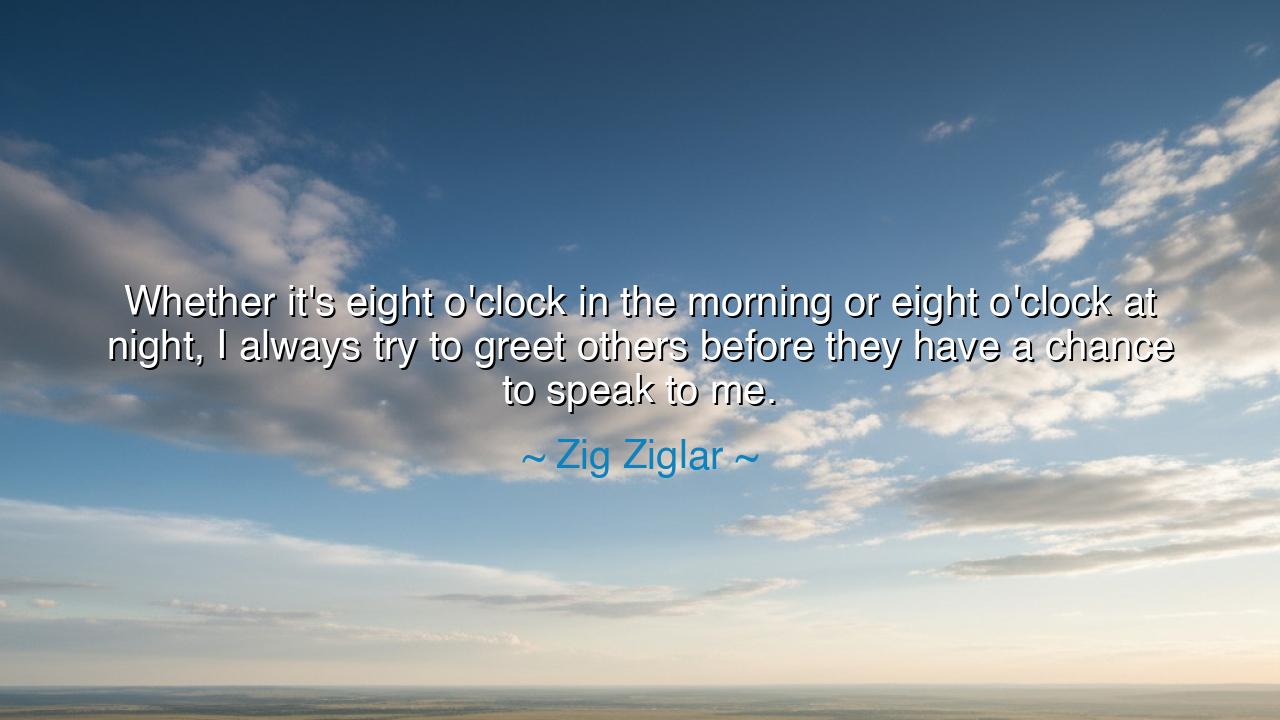
Whether it's eight o'clock in the morning or eight o'clock at
Whether it's eight o'clock in the morning or eight o'clock at night, I always try to greet others before they have a chance to speak to me.






In the heart of human interaction, there is a timeless principle that echoes across the ages: the power of a greeting. Zig Ziglar, in his profound wisdom, offers a glimpse into the essence of human connection when he says, “Whether it's eight o'clock in the morning or eight o'clock at night, I always try to greet others before they have a chance to speak to me.” These words carry with them a deep understanding of the importance of initiative in our relationships, for it is not merely the words we speak but the actions we take that shape the bonds we form with others.
The ancients understood the power of a greeting—of the first words spoken between individuals, for these words carried the potential to shape the course of a relationship. In ancient Greece, the great philosophers often spoke of the importance of respect and hospitality in human interactions. The act of greeting someone was not just a social formality; it was a ritual that demonstrated openness, kindness, and a recognition of the other’s humanity. Socrates himself, in his teachings, would often begin his dialogues with respectful words that set the tone for the conversations that would follow. Ziglar’s emphasis on greeting others first, regardless of the hour, is an extension of this ancient wisdom—an act that transcends mere politeness and reaches into the realm of deep human connection.
The act of initiating a greeting, of speaking first, is not just about the power of words; it is about the energy and attitude we bring into the world. By greeting others before they speak, we offer them respect and openness. We set the stage for a moment of connection, where the other person feels acknowledged before they even have a chance to introduce their own thoughts. In this simple yet profound gesture, we declare that we are not passive participants in our relationships, but active creators of the environment in which they unfold. The world is often filled with people waiting for others to take the first step, yet Ziglar’s approach reminds us that leadership and kindness often begin with the courage to speak first, to reach out before we are spoken to.
Consider the example of Alexander the Great, a man whose leadership was marked not only by his military conquests but by his ability to connect with those around him. He was known for the respect he showed his soldiers, often greeting them personally before battles, instilling in them a sense of unity and purpose. By reaching out first, he set a tone of mutual respect that encouraged loyalty and collaboration. In the same way, Ziglar emphasizes that when we take the initiative to greet others, we foster a spirit of goodwill and collaboration. It is through these small acts of initiation that we build trust and forge deeper connections, whether in leadership or in personal relationships.
There is a subtle but powerful lesson in this practice. In a world where many are consumed by their own concerns, where so much attention is given to what we need, what we want, and what we hope to gain, Ziglar’s simple act of greeting first offers a model of selflessness. It is a reminder that true connection begins not with waiting for others to approach us, but by reaching out to them, offering a hand before it is asked for. This proactive kindness does not merely benefit the one greeted; it nourishes the soul of the one who offers the greeting, for in this simple act, we reaffirm our humanity and our interdependence.
In our own lives, we can apply Ziglar’s wisdom to transform our relationships and the way we engage with the world. Whether it is in the workplace, in our families, or in our communities, the simple act of greeting others first can change the dynamics of any interaction. It is an invitation to acknowledge the presence of others, to recognize their worth, and to create an environment where mutual respect can flourish. Rather than waiting for someone to speak to us or make the first move, we can take the initiative, and in doing so, we shift the energy of our environment toward connection, kindness, and understanding.
The lesson here is profound: leadership and connection often begin with the courage to speak first. In a world that often feels divided and uncertain, the simple act of greeting someone before they greet you can have a ripple effect, creating a culture of respect, goodwill, and collaboration. Let us take Ziglar’s wisdom to heart and choose, every day, to greet others with openness and warmth, to lead with kindness and to create spaces where human connection is the most important thing we share. In this way, we contribute to the world not just with our words, but with our actions, cultivating a life rich in meaning, relationships, and compassion.






AAdministratorAdministrator
Welcome, honored guests. Please leave a comment, we will respond soon